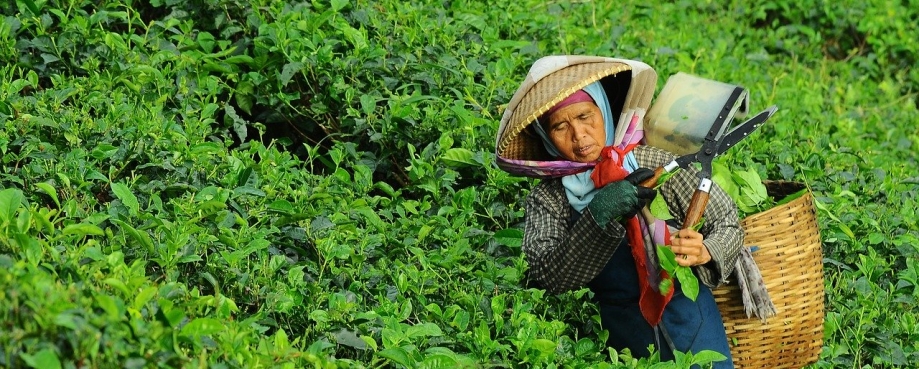
One of my idols, Kevin Kelly of Wired Magazine says: “When crisis and disaster strike, don’t waste them. No problems, no progress.”
On 16 June, THIRST is hosting a virtual roundtable meeting entitled Building Tea Back Better for all those who want to see the global tea industry emerge from coronavirus a fairer and more resilient industry.
Fair
Fairer to everyone, including the workers who, from almost the inception of the industry, have been reported as suffering lower wages, worse health, poorer living conditions, worse sanitation and less freedom than most of their compatriots. Fairer to the smallholder farmers without the power to negotiate fair prices.
Resilient
More resilient for workers. More resilient against the inexorable rise of the coffee- and flavoured-bottled-water-drinking generation. More resilient against the increasing reluctance of the children of tea pluckers to follow in their parents’ weary, leech-bitten, footsteps. More resilient against over-supply, climate change and rising costs.
Thankfully, the tea industry has so far largely escaped the disease on its estates (touch wood – then sanitize it), but on top of all the problems above, it has sustained huge losses from the lockdowns and slowdowns caused by the need for social distancing and sanitization. And with the public unlikely to rush back to drinking higher-value tea at out-of-home outlets – recovery may be equally slow.
The global tea industry has many strengths. It has provided millions with work, housing, education, healthcare and livelihoods. It has provided billions with the delicious, soothing, health-giving brew that remains the world’s second most popular drink after water. And it has provided wealth to many business owners and investors.
But it has done so largely using a 19th century model of employment and trade that is no longer sustainable. The tea industry is by and large a very traditional one. In many ways, it’s more of a family – stretching back for generations – than a business. But like many families there can be hidden pain which even those inflicting it are not aware of. Or, if they are, they are not sure how to escape from the traditional ways.
Again and again reports emerge of this pain – tarnishing tea’s image. This not only goes against the international drive towards ever more ethical standards in business, but unless something changes, soon it won’t just be the children of tea pluckers who shun the industry. The moral compass of young people everywhere will be steering it away from the marketing and retail end too.
Will customers follow? The recent Edelman brand trust report showed that most people (71%) in a multi-country survey “agree that if they perceive that a brand is putting profit over people, they will lose trust in that brand forever.” Edelman had earlier found that “brand trust is on par with quality, value, convenience and ingredients as a purchase consideration.” It concludes that “companies will regain trust only by listening to the needs of their consumers and workers — even after the economy reopens … people have long memories.”
So let’s not waste the creeping crisis that’s been stalking the tea industry, nor this coronavirus disaster. Let’s use them as an opportunity to build a better, fairer and more resilient industry that's fit for the 21st Century.
- What kind of future do you want for the tea industry?
- What kind of future does the younger generation – on and off the tea estate – want?
- How can we get there?
Many in the industry have been seeking new, creative ways to envision tea production and marketing. Like going beyond organic to biodynamic. Like investing with purpose rather than solely for profit. Like workers from closed tea estates forming co-operatives and diversifying their crops. Like trade unions adapting their processes so women – the majority of tea workers – have a stronger voice. Like tea buyers making long term commitments to their customers and valuing single estate tea properly so that that estate can meet the cost of sustainable production…
Within these ideas could lie the seeds of a fairer and more resilient tea industry that’s fit for the 21st Century.
On 16 June you can hear how they have been put into practice in Assam, Darjeeling, Germany, Kenya, Malawi, Sri Lanka, and the UK. Then choose one or more – or suggest others – for more in-depth follow-up discussions in the coming months. Discussions designed to lead to action. To progress.
Register now to join the business leaders, buyers, CSR professionals, trade unionists, NGOs, activists, consumers, co-operative members, standards bodies, lawyers, academics and more who have already signed up to be part of the conversation on Building Tea Back Better.
Joining details
Registration
https://www.eventbrite.co.uk/e/building-tea-back-better-tickets-105937955276
Time
- UTC 08:00 – 09:30 followed by optional free discussion zone 09:30-10:00
- CEST 10:00 – 11:30 (+discussion 11:30-12:00)
- CAT 10:00 –11:30 (+discussion 11:30-12:00)
- IST 13:30 – 15:00 (+discussion 15:00-15:30)
- BST 09:00 – 10:30 (+discussion 10:30-11:00)
- EAT 11:00 –12:30 (+discussion 12:30 – 13:00)
- EDT 04:00 – 05:30 (+discussion 05:30 – 06:00)
Platform
Zoom (administered by Ethical Tea Partnership)
Format
- Section 1: Social Dialogue Working for Women
- Section 2: Sustainable Business Models
- Section 3: Sustainable Purchasing Practices
There will be three speakers in each section, followed by a 10 minute discussion led by a discussant.
Participants are invited to suggest topics for multi-stakeholder follow-up discussions in the coming months.
